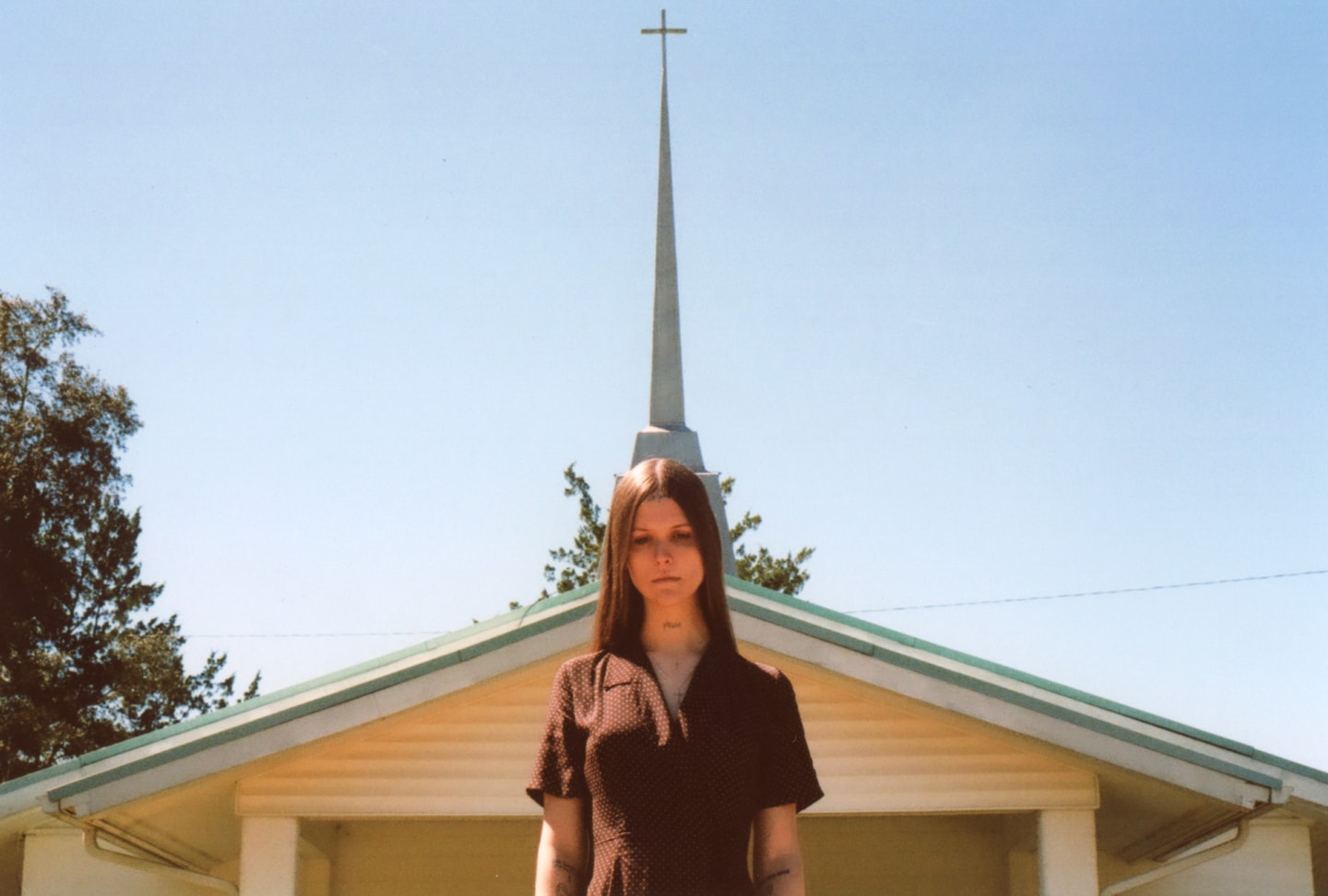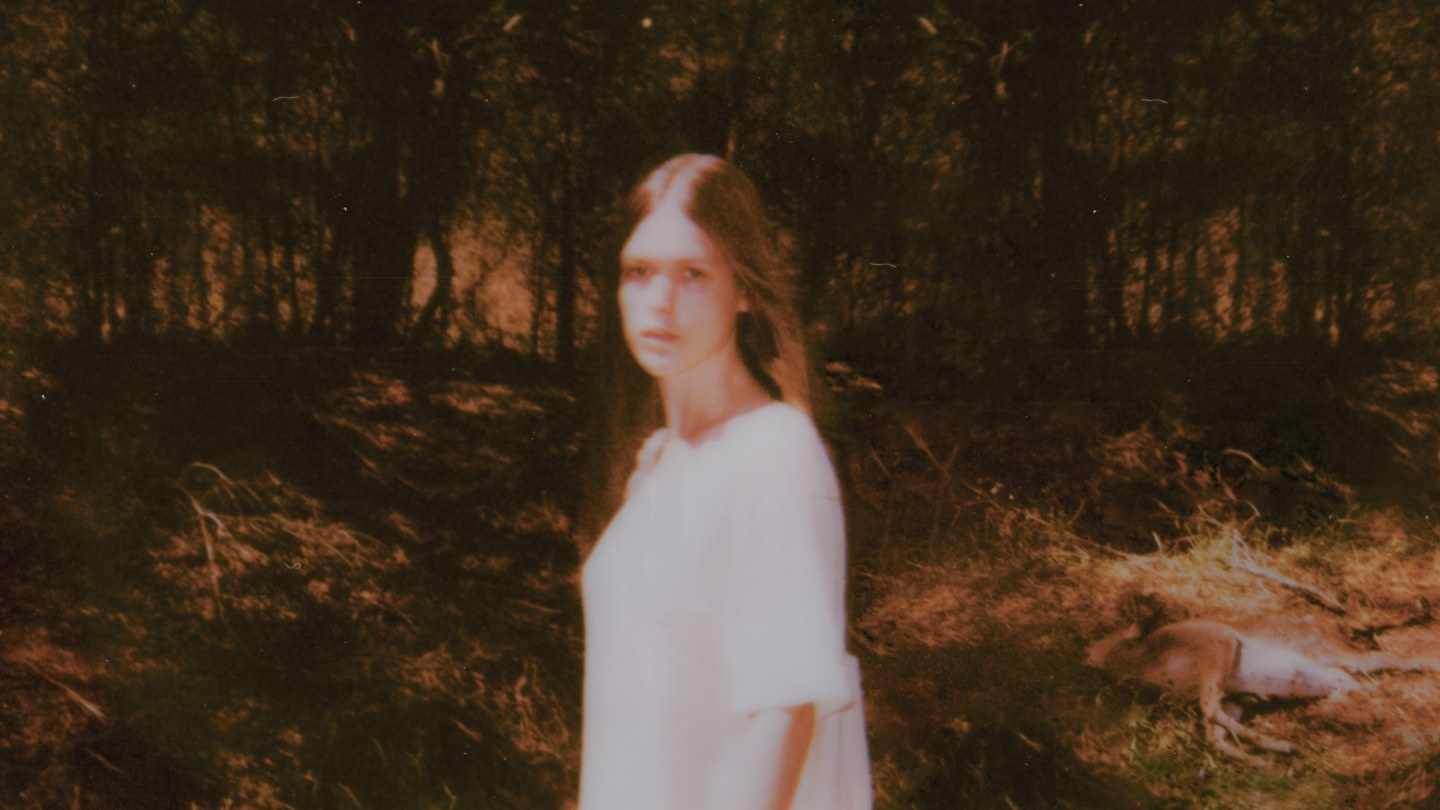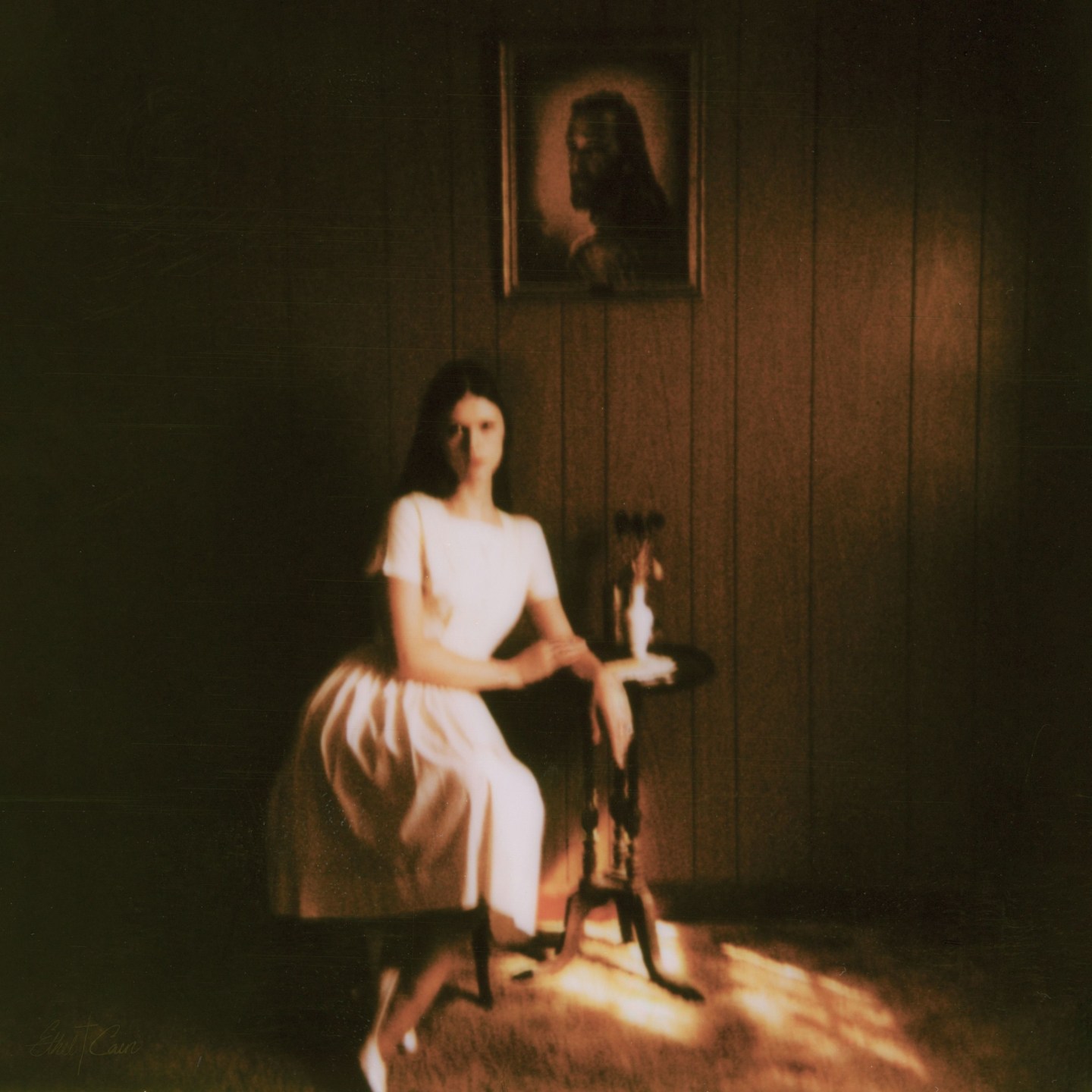 Photo by Helen Kirbo.
Photo by Helen Kirbo.
Just a year after releasing her breakout EP Inbred, Hayden Anhedönia, the 24-year-old Florida native who writes and performs as Ethel Cain, is ready to kill off her alter-ego. It’s a story she tells on her debut album as Cain, Preacher’s Daughter, a project that entwines slowcore and stadium rock into a staggering Southern Gothic anchored by the doom of intergenerational, middle-American trauma.
On the heels of its release, Anhedönia spoke with The FADER’s Salvatore Maicki about the development (and ultimate demise) of Ethel Cain as a character, her objections to being classified as a pop act, and how she plans to continue climbing up Cain’s family tree on her next record.
 Photo by Ethel Cain.
Photo by Ethel Cain.
This Q&A is taken from the latest episode of The FADER Interview. To hear this week’s show in full, and to access the podcast’s archive, click here.
The FADER: Preacher’s Daughter has been out in the universe for about a week now. How does it feel?
Hayden Anhedönia: Honestly really weird. For the past four years, this has always been my mountain on the horizon. And now that I’m past it, I have to throw another something as far as I can and set another goal, because if I don’t have a very clear set goal I’m working towards, I feel like I’m free falling. My brain is like, “There’s nothing between you and the end of your life; up next is death.” And I’m like, “No, I have to put up a wall.” It’s so dramatic. I get really out of my head, but also too in my head. So it’s been really weird being on this side of the record. It’s new emotions I’ve never felt before.
Well, how is Hayden doing, but also how is Ethel doing? Is she alive? Can you confirm?
She’s dead, but I’m OK. There’s a lot that’s overwhelming, but I’m trying to roll with it and not get too inundated. I’ve been sick this week from traveling. I was just in Paris and I’ve never left the country before, so I think that was weird on my body.
Where specifically did this project begin? What was the room? Where was the town?
This project started back in Florida. I mean, everything that inspired it happened in my hometown, but the creation of this record started in Florida, in this little house. The address was 724 West Brevard St. It’s down the street from the Burger King and the liquor store. I lived in this little house with my best friend at the time. I was sitting on the floor with my computer, going through some samples, and I found that piano sample that’s in “A House In Nebraska,” and I was like, “Holy crap, this is it. This is something else.” I was making completely different types of music at the time, but I was just like, “This is what I’m supposed to do.” I think I wrote “A House In Nebraska” in 10, 15 minutes. It just spilled out over this piano loop.
From then on out, Ethel Cain just happened. Everything I did seemed to be another step in that direction until one day I woke up and my whole closet was white dresses and my hair had grown twice as long and I had stopped coloring it. I was no longer listening to crazy heavy synth electronic music; I was listening to Nicole Dollanganger and Grouper and Slowdive and Def Leppard… artists who aren’t making songs about partying in the club and doing drugs and drinking [but] about riding across America and digging into dead animals with your hands.
”A House In Nebraska,” what a special song. It’s existed in the Ethel Cain cinematic universe for a few years. Has the meaning changed since then?
Honestly, no. It’s been the anchor for the whole project. The song really didn’t change that much in those four years. It’s always been what I’ve tethered the rest of this story to, that house in Nebraska. I named it that because I wanted it to be this escapist place in the dead center of America. It was always meant to symbolize this central point that everything else revolves around. All these songs exist inside this house in Nebraska, and none of this would’ve happened if I [hadn’t] written that song.
It definitely feels like the north star of this project, but the quest to get there falls off track with what this character endures during the course of this record. Talk to me how that story came together. I read the record started as a screenplay, and now the fans on Twitter have extrapolated the plot.
I love a good drama, a good American epic. There’s a specific intersection between mundane and fantastical that really scratches an itch for me. A lot of movies are either very fantastical… a little too fictional to be real [or] very mundane, very possible, and they bore me. I wanted to tell a story that was possible and mundane, but also melodramatic and very over the top. It could happen, but it’s also once in a lifetime, like “what are the odds?”
I wanted to take my story — the things that had happened to me — and turn it into something exciting. When I was a kid, I was like, “Well, if all these bad things are going to happen to me, I wish that they’d at least be dramatic and cool, but I’m just miserable and it’s boring. It’s not special. It’s not a movie moment. It’s just real and it sucks.” So I [wanted] to take that and make it not fun, but engaging… this story of this girl who is trapped in this stifling environment and stuffed into a mold she doesn’t fit in. And then she has this boyfriend and he runs away. Then she has another boyfriend and he’s bad for her. And then he dies and then she runs away and gets kidnapped, and she’s in strip clubs doing drugs, and she gets kidnapped and eaten by her killer.
It’s over the top, but it’s still very down to earth. It’s a caricature of America, but its themes [are] things that happen every day. Living in Florida, it’s 100 degrees always with 100 percent humidity. You feel like you’re in a greenhouse. And I was smoking a ton of weed every day [listening to] slowcore and midwest emo bands like Title Fight and American Football and female singers that are very lazy like Mazzy Star. I had this picture of this hot, uncomfortable, [un]glamorous American epic of a girl who is trying to be anything but what she’s been told to be.
 Preacher’s Daughter cover art. Photo by Silken Weinberg.
Preacher’s Daughter cover art. Photo by Silken Weinberg.
I’m curious how you move forward with the character now that Ethel has died. Are you planning on exploring the afterlife?
Ethel is dead — end of the line — so now it’s time to work backwards. The next record is exploring her mother: how her mother met her father, her mother’s pregnancy with her. One conclusion I had over the course of this record is that your mother might be the source of all your problems, but she’s also a victim of things that happened before you were even thought up. There are no good guys or bad guys in real life, just deeply flawed people.
I was kind of like making the backstory for [Ethel’s] mother to help me build the world of Ethel. And then I was like, “Fuck it, let’s go explore the mom’s life.” And then I was like, “Well, let’s go even further up the family tree. How does the grandmother play into this?” And it became this three-generation struggle of how all these women’s individual stories affect each other. It mirrors my relationship with my mother and grandmother: how their relationship impacted me and how all their individual experiences affected them. Everything’s connected, and how we exist in each other’s lives is fascinating to me, so I just want to explore it in as excruciating depth as possible on this record.
A lot of this story is yet to be told, but I have time. It’s gonna be a long project across multiple mediums. I’m excited to do whatever I want with it and fully explore this world of Ethel Cain and her mother and grandmother, these hopeless women who are impossibly traumatized and perpetrators of their own sins — deeply flawed women in a deeply flawed country.
Have you been able to share this record with your mother?
Oh, yeah. Conversations with [my mother] inspired a lot of this record. When I first started writing this, it was a big “fuck you” to my mom: “I’m the victim. You ruined my life. I’m so traumatized and this is all your fault.” And then through conversations, you learn to forgive. While things were done that never should’ve been done… she had her reasons. You can never fully demonize another human being. There’s maybe not an excuse, but there’s an explanation.
I’ve shared this record with my mother over the course of writing it and told her exactly how I’m feeling and what my goals are. I’ve gotten closer with her, which has influenced the record, and the record has influenced me to get closer to her. It’s been very therapeutic. I’ve seen people talk about the record like, “Damn, did you even try to be happy? This level of depression and misery and pessimism is dangerous and you should never give into it.” But the record is so depressing and dark because it’s been my scapegoat. It’s given me the opportunity in my personal life to let go and be happy. I’m in a much more positive place in my life now because I was able to kind of exorcize these feelings into this record. I’d rather the music be dark and awful than my heart be that way forever.
“Gibson Girl” was such a stark choice as a lead single. There’s so much in it that I’m curious about. How did it begin?
One of the aspects of this story that I talk about a lot is the purity of this girl. The forced purity of being this preacher’s daughter that she can’t quite live up to. It’s the Madonna–Whore Complex, this dark pit that was looming in this story [when] she’s getting pimped out and ravaged by these men.
I think I was 21 when I wrote that song. It doesn’t take long to get tired of men wanting to have sex with you and ditch you. It’s very exhausting, and you think you’re alone, but then you realize that every woman on the planet goes through it at some point… treated like a piece of meat and chewed up and spit out. The fact that every woman goes through it doesn’t change the fact that it’s so cripplingly lonely to go through.
I always thought that I was forward and dominant in sexual situations with men, and then I realized I’ve only ever been forward and dominant because I’d rather feel like it’s something I’m giving up than something being taken from me. I’ve always had this vision of being like this Gibson girl, this perfect vision of beauty with her hair done up and her waist cinched and her face perfectly flushed. She bats her eyes the right way and she drapes over the couch the right way. [But] in reality, they’re still getting what they want and I’m still sitting there completely alone and empty at the end of the day. I wanted that to translate into this story [of] her being used by these men and trying to establish even some false semblance of control.
So it bounces back and forth in the verses. She’s telling these men, “You want me. You want to get my clothes off. You want to hurt me… How do I know that? Well, you’re all the same. I know you. I know you. I’m this bad, sexy bitch. I’m in control. This isn’t my first rodeo.” But then it pivots and it slows down for the chorus. There’s a tempo change, and she’s no longer talking to these men. It’s this one man telling her “If it feels good, it can’t be bad.” And she’s like, “You’re right. You’re right.” And then she goes and has another one and another one and another one. She’s trying to convince herself she’s in control of a situation where she’s absolutely helpless.
At the end of the song, she’s spinning in circles. She’s like, “You want to love me right now? You want to fuck me right now?” And these phrases go back and forth simultaneously because she gets them confused. It’s very hazy… “Am I a man eater, or am I getting eaten?”
Zooming out from Ethel the character to Ethel the pop star, to opt for "Gibson Girl" as the lead single when there’s a big audience ready to hear something perhaps more aligned with one of the big singles off your last EP... that’s quite a statement in itself.
There seems to be this narrative that I make pop music. I keep reading it everywhere. I this it’s all coming from “Crush,” which was a fun song, but I honestly reject ever making it because people are obsessed with pop music. If they hear you do even a shred of anything pop, they’re like, “We only want this from you.” So I was like, “Fuck it. You want pop music? Here’s ‘Gibson Girl.’” You think you’re gonna get this slow, sultry, sexy, synthy, bassy, album of slutty, pop music, and then you get this back-loaded album full of ballads that are eight minutes long and kind of boring and very reliant on the lyrics and songwriting, not the production. I don’t want to become known for crazy production [or] pop gimmicks. I don’t want to be known as the bitch who wrote, “I owe you a black eye and two kisses.” I want to be known as the girl who wrote, “God loves you, but not enough to save you.” I’m not a fucking pop artist. I reject that wholeheartedly.